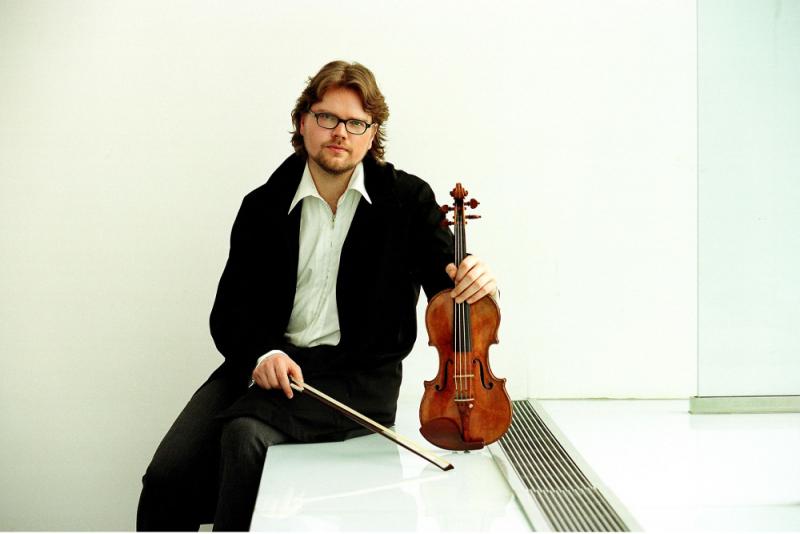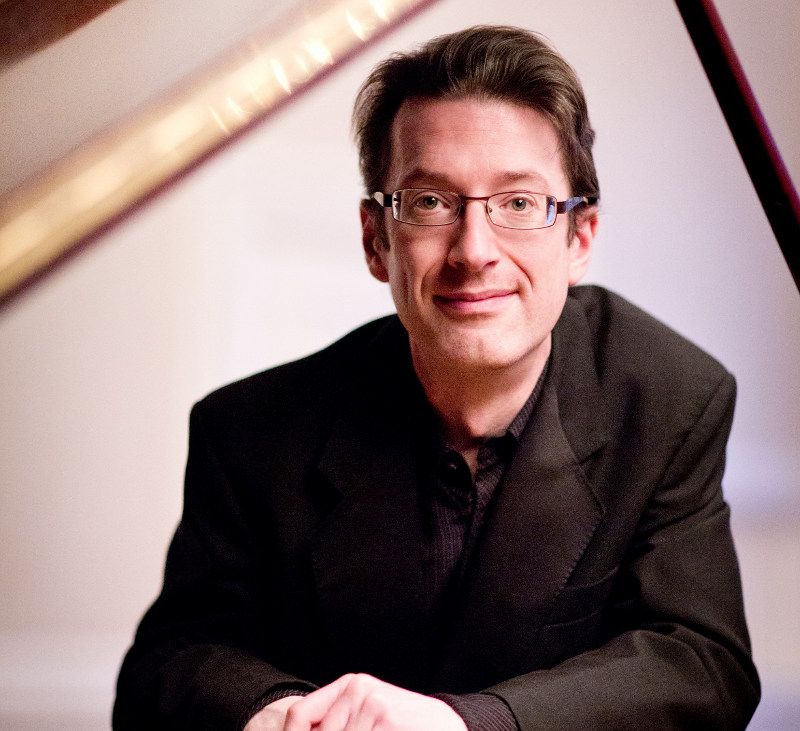Williams, Janiczek, Scottish Chamber Orchestra, Queen's Hall, Edinburgh | reviews, news & interviews
Williams, Janiczek, Scottish Chamber Orchestra, Queen's Hall, Edinburgh
Williams, Janiczek, Scottish Chamber Orchestra, Queen's Hall, Edinburgh
A joyful evening of Mozart and Beethoven lays bare the mechanics of music making

Just a few days earlier, the Scottish Chamber Orchestra had been doing a pretty convincing impression of a symphony orchestra in a powerful Vaughan Williams Fifth Symphony under John Storgårds. And here they were, in crisp, nimble Mozart and Beethoven, being a thoroughly convincing period band – well, with valveless horns, at least. They’re nothing if not versatile.
But the real joy of their conductorless concert – and joyful it truly was – was its laying bare of the mechanics of music making itself, and in just about every combination made possible by the absence of a conductor. For that, they were joined by two quite remarkable and, in their own ways, idiosyncratic soloists.
 Violinist Alexander Janiczek is an associate artist with the SCO, and clearly has an easy rapport with the players, who responded with unerring conviction to his urgent direction of a seldom-played Symphony in G by CPE Bach, which Janiczek led from the concertmaster’s desk. Brisk, vivid and beautifully characterful, it was over in just a few minutes, but it left a strong impression nonetheless – full of verve, gusto, and anything but polite. If only the SCO players could have looked a little more like they were actually enjoying themselves.
Violinist Alexander Janiczek is an associate artist with the SCO, and clearly has an easy rapport with the players, who responded with unerring conviction to his urgent direction of a seldom-played Symphony in G by CPE Bach, which Janiczek led from the concertmaster’s desk. Brisk, vivid and beautifully characterful, it was over in just a few minutes, but it left a strong impression nonetheless – full of verve, gusto, and anything but polite. If only the SCO players could have looked a little more like they were actually enjoying themselves.
Janiczek returned, this time standing in front of the band as soloist and director, in Mozart’s Second Violin Concerto, gently urging on the orchestral players and presenting the soloist’s role very much as first among equals, differentiating himself more by his bright, sometimes rather piercing tone than anything else. If the third movement rondo seemed to lack a bit of the spontaneity that had made the previous two movements so convincing, it was a thoughtful, compelling account nonetheless – followed by an equally charismatic reading of the Rondo in C, K373.
This was chamber music writ largeAfter the interval, another soloist joined the fun – pianist Llŷr Williams (pictured above right), directing Beethoven’s Fourth Piano Concerto from the keyboard, or strictly speaking leaping up and down from the piano stool to lean in towards the woodwind and strings with his concise gestures, before hastily sitting back down to regain his composure. It wasn’t always convincing – it produced a curiously restless second movement, for instance, where Williams’s haloed piano chorales always felt undermined by the knowledge that he was about to jump to his feet for another of the strings’ assertive outbursts. But it was fascinating to behold – especially in his natural partnership with Janiczek, who took over leading the band in some of the piano’s busier passages.
Balance was inevitably something of an issue: Williams’s concert Steinway often felt simply too weighty for the focused brilliance of the orchestral playing, even though he played with clarity and simplicity, rarely thundering, beautifully unshowy, with articulation so precise it bordered on the fussy. And despite a few moments where ensemble between soloist and orchestra went very slightly awry, the unanimity of intention was quite something to behold – a cliché to say so, but this was chamber music writ large. Not a concert of wild, provocative revelations, perhaps, but of assured, perceptive music making, and of many minds uniting with a single intent.
rating
Explore topics
Share this article
The future of Arts Journalism
You can stop theartsdesk.com closing!
We urgently need financing to survive. Our fundraising drive has thus far raised £49,000 but we need to reach £100,000 or we will be forced to close. Please contribute here: https://gofund.me/c3f6033d
And if you can forward this information to anyone who might assist, we’d be grateful.

Subscribe to theartsdesk.com
Thank you for continuing to read our work on theartsdesk.com. For unlimited access to every article in its entirety, including our archive of more than 15,000 pieces, we're asking for £5 per month or £40 per year. We feel it's a very good deal, and hope you do too.
To take a subscription now simply click here.
And if you're looking for that extra gift for a friend or family member, why not treat them to a theartsdesk.com gift subscription?
more Classical music
 Solomon, OAE, Butt, QEH review - daft Biblical whitewashing with great choruses
Even a top soprano and mezzo can’t make this Handel paean wholly convincing
Solomon, OAE, Butt, QEH review - daft Biblical whitewashing with great choruses
Even a top soprano and mezzo can’t make this Handel paean wholly convincing
 Two-Piano Gala, Kings Place review - shining constellations
London Piano Festival curators and illustrious friends entertain and enlighten
Two-Piano Gala, Kings Place review - shining constellations
London Piano Festival curators and illustrious friends entertain and enlighten
 Echo Vocal Ensemble, Latto, Union Chapel review - eclectic choral programme garlanded with dance
Beautiful singing at the heart of an imaginative and stylistically varied concert
Echo Vocal Ensemble, Latto, Union Chapel review - eclectic choral programme garlanded with dance
Beautiful singing at the heart of an imaginative and stylistically varied concert
 Scott, Irish Baroque Orchestra, Whelan, RIAM, Dublin review - towards a Mozart masterpiece
Characteristic joy and enlightenment from this team, but a valveless horn brings problems
Scott, Irish Baroque Orchestra, Whelan, RIAM, Dublin review - towards a Mozart masterpiece
Characteristic joy and enlightenment from this team, but a valveless horn brings problems
 Classical CDs: Voice flutes, flugelhorns and froth
Baroque sonatas, English orchestral music and an emotionally-charged vocal recital
Classical CDs: Voice flutes, flugelhorns and froth
Baroque sonatas, English orchestral music and an emotionally-charged vocal recital
 Kanneh-Mason, Britten Sinfonia, Shave, Milton Court - a grin and a big beaming smile
A pair of striking contemporary pieces alongside two old favourites
Kanneh-Mason, Britten Sinfonia, Shave, Milton Court - a grin and a big beaming smile
A pair of striking contemporary pieces alongside two old favourites
 theartsdesk at the New Ross Piano Festival - Finghin Collins’ musical rainbow
From revelatory Bach played with astounding maturity by a 22 year old to four-hand jazz
theartsdesk at the New Ross Piano Festival - Finghin Collins’ musical rainbow
From revelatory Bach played with astounding maturity by a 22 year old to four-hand jazz
 First Person: Manchester Camerata's Head of Artistic Planning Clara Marshall Cawley on questioning the status quo
Five days of free events with all sorts of audiences around Manchester starts tomorrow
First Person: Manchester Camerata's Head of Artistic Planning Clara Marshall Cawley on questioning the status quo
Five days of free events with all sorts of audiences around Manchester starts tomorrow
 Goldscheider, Brother Tree Sound, Kings Place review - music of hope from a young composer
Unusual combination of horn, strings and electronics makes for some intriguing listening
Goldscheider, Brother Tree Sound, Kings Place review - music of hope from a young composer
Unusual combination of horn, strings and electronics makes for some intriguing listening
 theartsdesk Q&A: composer Donghoon Shin on his new concerto for pianist Seong-Jin Cho
Classical music makes its debut at London's K-Music Festival
theartsdesk Q&A: composer Donghoon Shin on his new concerto for pianist Seong-Jin Cho
Classical music makes its debut at London's K-Music Festival

Add comment